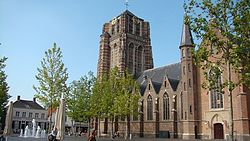Oosterhout
Oosterhout | |
|---|---|
 Market square in Oosterhout | |
 Location in North Brabant | |
| Coordinates: 51°38′N 4°52′E / 51.633°N 4.867°E | |
| Country | Netherlands |
| Province | North Brabant |
| Government | |
| • Body | Municipal council |
| • Mayor | Marcel Fränzel (acting) (D66) |
| Area | |
| • Total | 73.09 km2 (28.22 sq mi) |
| • Land | 71.47 km2 (27.59 sq mi) |
| • Water | 1.62 km2 (0.63 sq mi) |
| Elevation | 5 m (16 ft) |
| Population (January 2021)[4] | |
| • Total | 56,206 |
| • Density | 786/km2 (2,040/sq mi) |
| Demonym | Oosterhouter |
| Time zone | UTC+1 (CET) |
| • Summer (DST) | UTC+2 (CEST) |
| Postcode | 4849, 4900–4911 |
| Area code | 0162 |
| Website | www |

Oosterhout (Dutch pronunciation: [ˈoːstərɦʌut] ; from ooster, "eastern", and hout, "woods") is a municipality and a city in the southern Netherlands. The municipality had a population of 56,206 in 2021.
Population centers
The municipality of Oosterhout includes the following places:
History
Oosterhout is mentioned for the first time in 1277, although archaeological excavations showed the existence of human settlements in the area in prehistoric times. The Knights Templar had a temple here dedicated to St. John the Baptist. It was home to a castle which later acquired control over the surrounding area, up to Breda and Bergen op Zoom. The castle was destroyed by Spanish troops during the Eighty Years War, in 1573; only a tower of it survives today.
The city became the seat of a flourishing ceramics industry, which lasted until the 19th century. In 1625 the city was besieged by Frederick Henry, Prince of Orange, and suffered heavy damage.
Despite the rise of Protestantism, it was home to several Catholic monasteries, including that of the Premonstratensians, which is still active. Oosterhout received city rights in 1809, by will of Louis Bonaparte.
Main sights
- Slotjes (Castle)
- Unfinished basilica of St. John. A Romanesque church existed in 1277, but from around 1473 it was rebuilt in the current Gothic style, being finished in 1493. The tower was constructed from 1519 to 1552. It was restored several times in the following centuries.
- Monastery of St. Catherine, once a castle held by the Knights Hospitaller.
- Slotbossetoren, destroyed castle
Sport
Oosterhout is home to several sports clubs, for example volleyball club VOKO, football clubs SCO-Tofs, VV Oosterhout, baseball club Twins and hockey club De Warande.
Sport Clubs
- VOKO, Volleyball
- ATV Scorpio, Athletics
- SCO-Tofs, Football
- TSC, Football
- VV Oosterhout, Football
- De Warande, Hockey
- OZ&PC De Warande, Swimming and Water polo
- De Voltreffers, Korfball
- De Glaskoning Twins, Baseball
Notable residents

- Willem Hendrik de Vriese (1806–1862) a Dutch botanist and physician
- Christiaan Snouck Hurgronje (1857–1936) a Dutch scholar of Oriental cultures and Advisor to the colonial government of the Netherlands East Indies
- Marinus De Jong (1891-1984) a Belgian composer and pianist of Dutch origin
- Gerrit Brokx (1933–2002) a Dutch politician
- Johannes Wilhelmus Maria Liesen (born 1960) a Dutch clergyman and bishop of the Roman Catholic Diocese of Breda
- Mirjam Mous (born 1963) a Dutch author of children's literature
- Marlies Dekkers (born 1965) a Dutch fashion designer
- Peter Kops (born 1967) known as Extince, a Dutch rapper
- Sander P. Zwegers (born 1975) a Dutch mathematician and academic
Sport

- Kees Pijl (1897–1976) a Dutch footballer with 203 caps for Feyenoord, competed in the 1924 Summer Olympics
- Wanny van Gils (1959–2018) a Dutch football player with over 300 club caps and coach
- Kelly van Zon (born 1987) a Dutch table tennis player
- Jennifer Vreugdenhil (born 1995) a Dutch footballer
Gallery
-
Katjeskelder Oosterhout
-
Oosterhout centrum
-
Put van Caron Oosterhout
References
- ^ "Burgemeester mr. drs. S.W.Th. Huisman" (in Dutch). Gemeente Oosterhout. Retrieved 2 June 2014.
- ^ "Kerncijfers wijken en buurten 2020" [Key figures for neighbourhoods 2020]. StatLine (in Dutch). CBS. 24 July 2020. Retrieved 19 September 2020.
- ^ "Postcodetool for 4902ZP". Actueel Hoogtebestand Nederland (in Dutch). Het Waterschapshuis. Retrieved 2 June 2014.
- ^ "Bevolkingsontwikkeling; regio per maand" [Population growth; regions per month]. CBS Statline (in Dutch). CBS. 1 January 2021. Retrieved 2 January 2022.
External links
 Media related to Oosterhout, North Brabant at Wikimedia Commons
Media related to Oosterhout, North Brabant at Wikimedia Commons- Official website






